Unit_2自考英语2课件
- 格式:pptx
- 大小:346.03 KB
- 文档页数:42
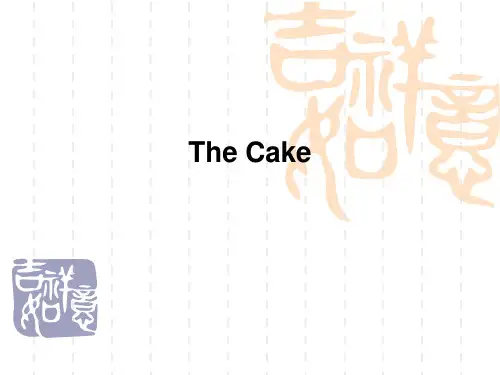
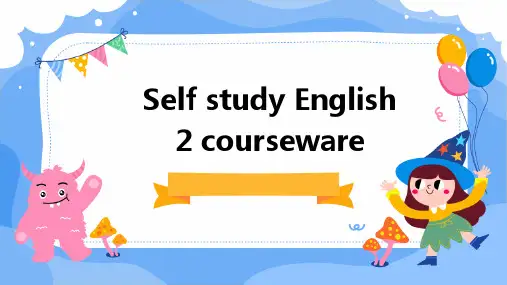
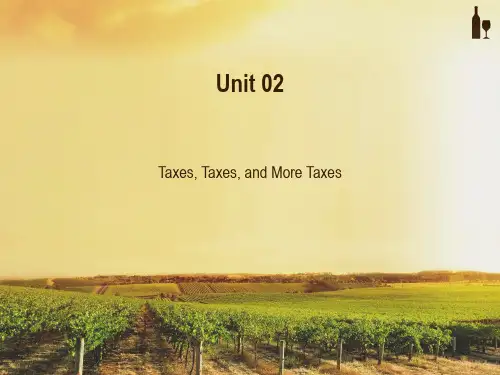
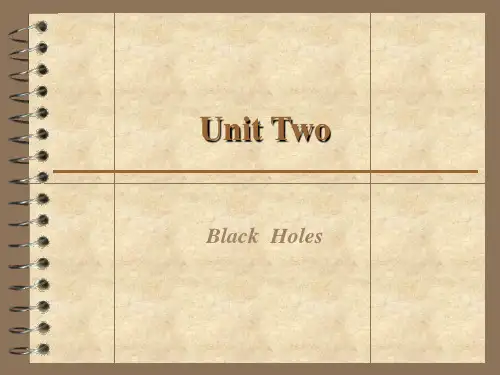
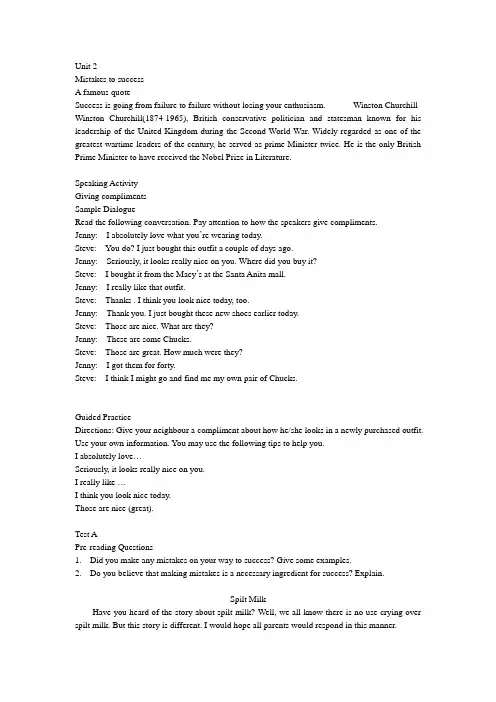
Unit 2Mistakes to successA famous quoteSuccess is going from failure to failure without losing your enthusiasm. -----Winston Churchill Winston Churchill(1874-1965), British conservative politician and statesman known for his leadership of the United Kingdom during the Second World War. Widely regarded as one of the greatest wartime leaders of the century, he served as prime Minister twice. He is the only British Prime Minister to have received the Nobel Prize in Literature.Speaking ActivityGiving complimentsSample DialogueRead the following conversation. Pay attention to how the speakers give compliments.Jenny: I absolutely love what you’re wearing today.Steve: You do? I just bought this outfit a couple of days ago.Jenny: Seriously, it looks really nice on you. Where did you buy it?Steve: I bought it from the Macy’s at the Santa Anita mall.Jenny: I really like that outfit.Steve: Thanks . I think you look nice today, too.Jenny: Thank you. I just bought these new shoes earlier today.Steve: Those are nice. What are they?Jenny: These are some Chucks.Steve: Those are great. How much were they?Jenny: I got them for forty.Steve: I think I might go and find me my own pair of Chucks.Guided PracticeDirections: Give your neighbour a compliment about how he/she looks in a newly purchased outfit. Use your own information. You may use the following tips to help you.I absolutely love…Seriously, it looks really nice on you.I really like …I think you look nice today.Those are nice (great).Test APre-reading Questions1.Did you make any mistakes on your way to success? Give some examples.2.Do you believe that making mistakes is a necessary ingredient for success? Explain.Spilt MilkHave you heard of the story about spilt milk? Well, we all know there is no use crying over spilt milk. But this story is different. I would hope all parents would respond in this manner.I recently heard a story about a famous research scientist who had made several very important medical breakthroughs. He was interviewed by a newspaper reporter who asked him why he was so much more creative than the average person; what set him so far apart from others?He responded that, in his opinion, it all came from an experience with his mother that occurred when he was about two years old. He had been trying to remove a bottle of milk from the refrigerator when he lost his grip on the slippery bottle and it fell, spilling its contents all over the kitchen floor---a veritable sea of milk?When his mother came into the kitchen, instead of yelling at him, giving him a lecture, or punishing him, she said, ―Robert, what a great and wonderful mess you have done. I have rarely seen such a huge puddle of milk. Well, the damage has already been done. Would you like to get down and play in the milk for a few minutes before we clean it up?‖Indeed, he did. After a few minutes, his mother said, ―you know, Robert, whenever you make a mess like this, eventually you have to clean it up and restore everything to its proper order. So, how would you like to do that? We could use a sponge, a towel, or a mop. Which do you prefer? He chose the sponge and together they cleaned up the spilt milk.His mother then said, ―You know, what we have here is a failed experiment in how to effectively carry a big milk bottle with two tiny hands. Let’s go out in the back yard and fill the bottle with water and see if you can discover a way to carry it without dropping it..‖ The little boy learned that if he grasped the bottle at the top near the lip with both banks, he could carry it without dropping it. What a wonderful lesson!The renowned scientist remarked that it was at that moment that he know he didn’t need to he afraid to make mistakes. Instead, he learned that mistakes were just opportunities for learning something new, which is, after all, what scientific experiments are all about. Even if the experiment ―doesn’t work,‖ we usually learn something valuable from it.Wouldn’t it be great if all parents would respond the way Robert’s mother responded to him?Teat BPre-reading questions1.Have you ever been wrongly blamed by your parents? How did you feel at the moment?2.What suggestions would you give to the parents who are blinded to their children’smerits?The cakeCindy glanced nervously at the clock on the kitchen wall. Five minutes before midnight.―They should be home any time now,‖ she thought as she put the finishing touches on the chocolate cake she was frosting. It was the first time in her 12 years she had tried to makea cake from scratch, and to be honest, it wasn’t exactly an aesthetic triumph. The cake was …well, lumpy. And the frosting was bitter, as if she had run out of sugar or something, which, of course, she had.And then there was the way the kitchen looked. Imagine a huge blender filled with all the fixings for chocolate cake--- including the requisite bowls, pans and utensils. Now imagine that the blender is turned on. High speed. With the lid off. Do you get the idea?But Cindy wasn’t thinking about the mess. She had created something, a veritable phoenix of flour and sugar rising out of the kitchen clutter. She was anxious for her parents toreturn home from their date so she could present her anniversary gift to them. She turned off the kitchen lights and waited excitedly in the darkness. When at last she saw the flash of the car headlights, she positioned herself in the kitchen doorway. By the time she heard the key sliding into the front door, she was THIS CLOSE to exploding.Her parents tried to slip in quietly, but Cindy would have none of that. She flipped on the lights dramatically and trumpeted: ―Ta-daaa!‖ She gestured grandly toward the kitchen table, where a slightly off-balance two-layer chocolate cake awaited their inspection.But her mother’s eye never made it all the way to the table. ―Just look at this mess!‖ she moaned. ―How many times have I talked to you about cleaning up after yourself?―But Mom, I was only…‖―I should make you clean this up right now, but I’m too tired to stay up with you to make sure you get it done right,‖ her mother said. ―So you’ll do it first thing in the morning.‖―Honey,‖ Cindy’s father interjected gently, ―take a look at the table.‖―I know --- it’s a mess,‖ his wife said coldly. ―The whole kitchen is a disaster. I can’t stand to look at it.‖She stormed up the stairs and into her room, slamming the door shut behind her.For a few moments Cindy and her father stood silently, neither one knowing what to say. At last she looked up at him, her eyes moist and red. ―She never saw the cake,‖ she said.Unfortunately, Cindy’s mother isn’t the only parent who suffers from Situational Timbercular Glaucoma – the occasional inability to see the forest for the trees. From time to time we all allow ourselves to be blinded to issues of long-term significance by stuff that seems awfully important right now, but is n’t. Muddy shoes, lost lunch money and messy kitchens are troublesome, and they deserve their place among life’s frustrations. But what’s a little mud—even on new carpet –compared to a child’s self-esteem? Is a lost dollar more valuable than a youngster’s emerging dignity? And while kitchen sanitation is important, is it worth the sacrifice of tender feelings and relationships?I’m not saying that our children don’t need to learn responsibility, or the occasionally suffer the painful consequences of their own bad choices. Those lessons are vital, and need to be carefully taught. But as parents, we must never forget that we’re not just teaching lessons—we’re teaching children. That means there are times when we really need to see the mess in the kitchen, and times when we only need to see the cake.。
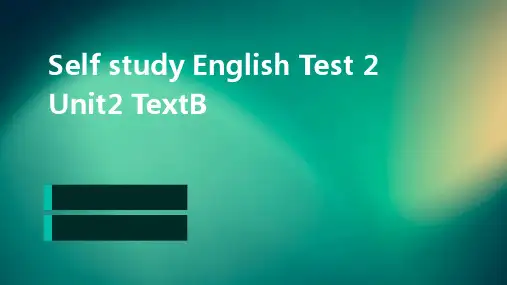
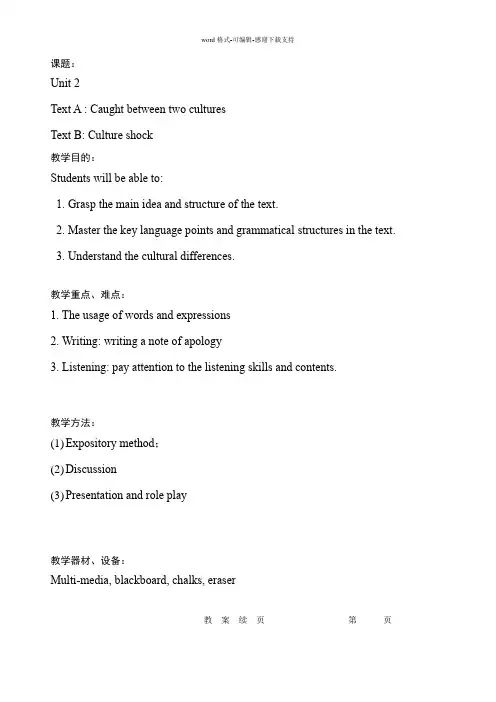
课题:Unit 2Text A : Caught between two culturesText B: Culture shock教学目的:Students will be able to:1. Grasp the main idea and structure of the text.2. Master the key language points and grammatical structures in the text.3. Understand the cultural differences.教学重点、难点:1. The usage of words and expressions2. Writing: writing a note of apology3. Listening: pay attention to the listening skills and contents.教学方法:(1)Expository method;(2)Discussion(3)Presentation and role play教学器材、设备:Multi-media, blackboard, chalks, eraser教案续页第页教学步骤、内容Text A Caught Between Two CulturesWarm-up activities1. Have you ever been abroad? If yes, please say something about your experience in another country. If not,do you know anything about foreign countries?2. If you have the chance to go abroad,what preparation will you do for that?Text A Caught Between Two Cultures•Culture is a term that has different meanings. For example, in 1952, Alfred Kroeber and Clyde Kluckhohn compiled a list of 164 definitions of "culture" in Culture: A Critical Review of Concepts and definitions. However the word "culture" is most commonly used in three basic senses:•Excellence of taste in the fine arts and humanities also known as high culture•An integrated pattern of human knowledge belief and behavior that depends upon the capacity for symbolic thought and social learning •The set of shared attitudes values goals and practices that characterizes an institution organization or groupText AnalysisThe author tells about the confusion she experienced in going back to her hometown after staying in the U.S. for six years. Through her ownexperience the author tries to illustrate the culture shock she suffered. Text OrganizationPart I: para. 1. Taking her own experience for example the author says she’s going through a difficult period in her life.Part II: para. 2-7. The author describes her experience of going back home.Part III. Para. 8.The author is in the dilemma.Language PointsPart 1:1. raise vt举起,升起e.g. He greeted her by raising his hat.提出e.g. May I raise a question?养育,饲养e.g. He has a large family to raise.The farmer raises cows and corn.2. For the past six years I've been living ...现在完成进行时Part II3. be eager to dosth.e.g. I'm eager to watch that film.be intent on doing sth.e.g. Pete seems intent on stirring up trouble.long to do sth/long for sth.e.g. This is the job that I've been longing for.4. concernVt.关系到,与,,,有关e.g. This matter concerns all of us.be concerned withe.g. Her job is something concerned with computers使担心,使关心:e.g. Her illness concerns me very much.be concerned aboute.g. They are very seriously concerned about the problems involvedAs far as sth. is concerned 就...而说e.g. As far as I'm concerned, I'm not very interested in this questionn.关怀,关心的事情e.g. Earning a living was his first concern5. associate...withe.g. We often associate Shanghai with prosperity and fashion.n. He is my business associate.Adj. He is an associate professor.association with6. I became more uncomfortable and hurt as things were said and done that made me feel that I was an outsider, a stranger in my own country.Part III7. cut sth short 缩短,中断e.g. She had to cut short her vacation when she heard that her mother was ill.cut sb. short 打断某人e.g. I tried to explain, but he cut me short.8. markn. 痕迹,记号e.g. There're some ink marks on your shirt.Vt.做记号于,标明e.g. Be careful not to mark the table.e.g. Please mark all the large cities on this map.Post ReadingUseful Expressions:1.生长在Be born and raised in...2. 经历go through3渴望做。

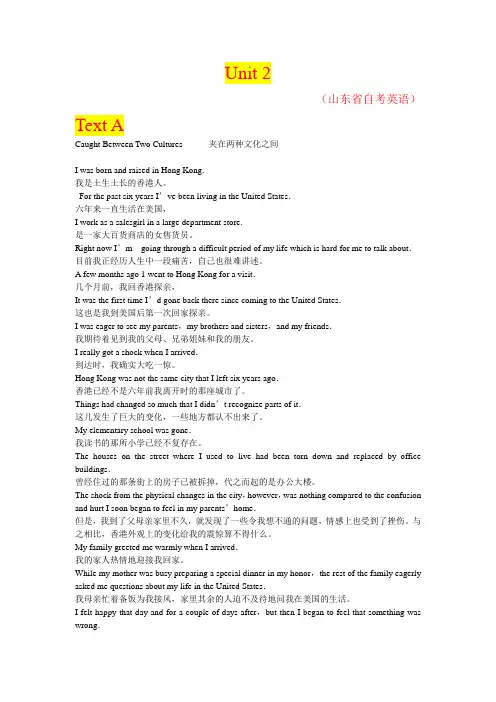
Unit 2(山东省自考英语)Text ACaught Between Two Cultures 夹在两种文化之间I was born and raised in Hong Kong.我是土生土长的香港人。
For the past six years I’ve been living in the United States.六年来一直生活在美国,I work as a salesgirl in a large department store.是一家大百货商店的女售货员。
Right now I’m going through a difficult period of my life which is hard for me to talk about.目前我正经历人生中一段痛苦,自己也很难讲述。
A few months ago 1 went to Hong Kong for a visit.几个月前,我回香港探亲,It was the first time I’d gone back there since coming to the United States.这也是我到美国后第一次回家探亲。
I was eager to see my parents,my brothers and sisters,and my friends.我期待着见到我的父母、兄弟姐妹和我的朋友。
I really got a shock when I arrived.到达时,我确实大吃一惊。
Hong Kong was not the same city that I left six years ago.香港已经不是六年前我离开时的那座城市了。
Things had changed so much that I didn’t recognize parts of it.这儿发生了巨大的变化,一些地方都认不出来了。
My elementary school was gone.我读书的那所小学已经不复存在。
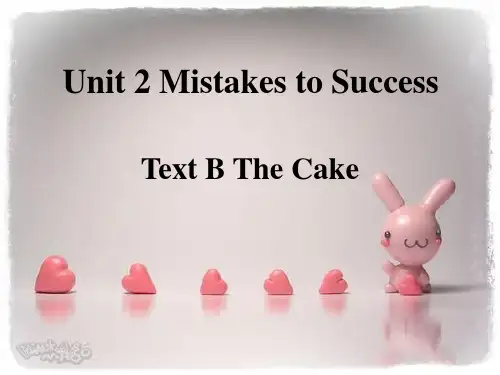
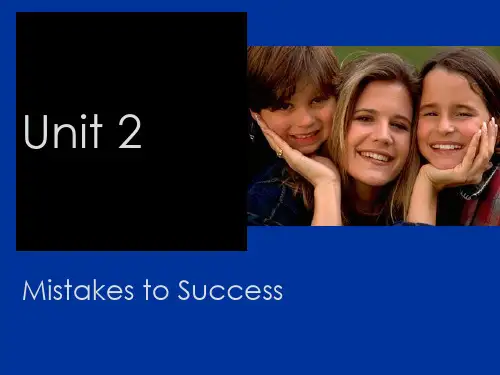
Unit 2 Mistakes to SuccessI. New words and expressions New words1. spill v.(使)洒出,泼出,溢出2. respond v. 作出反应;响应respond to…response3. interview v. (媒体)采访,访问4. creative adj. 创作的5. occur v. 发生;出现It occurred to me that…6. remove v. 拿开;去掉7. refrigerator n. 冰箱8. grip n. 紧握;紧抓9. slippery adj. 滑的;滑得抓不住(或站不稳、难以行走)10. content n. 所容纳之物;所含之物11. veritable adj. 十足的;名副其实的;不折不扣的12. yell v. 叫喊;大喊;吼叫13. lecture n.(冗长的)教训,训斥,谴责14. mess n. 肮脏;杂乱;不整洁15. rarely adv. 罕有;很少;不常rare animals / stampsRarely is he late for class.16. puddle n. 水洼;小水坑17. eventually 最后;终于18. restore v. 使复原;使复位;使复职19. sponge n. 海绵块20. effectively adv. 有效地effectiveineffective注意区分:effective / efficient21. tiny adj. 极小的;微小的22. discover v. 了解到;认识到;查明discovery23. grasp v. 抓紧;抓牢24. lip n.(容器或凹陷地方的)边,边沿25. renowned adj. 有名的;闻名的;受尊敬的26. remark v. 谈论;评论27. opportunity n. 机会;时机28. scientific adj. 科学(上)的;关于科学的sciencescientist例如:The medical science is making great progress in the treatment of cancer.You should provide scientific evidence instead of subjective evidence to prove this theory holds water.Several world-renowned scientists will be invited to attend the forum.29. valuable adj. 很有用的;很重要的;宝贵的Phrases and Expressions1. in this manner 用这种方式2. set…apart from 区别;使与众不同II. Text LearningSpilt Milk① Have you heard of the story about split milk? (1)Well, we all know there is no use crying over split milk. But this story is different. I would hope all parents would respond in this manner.② I recently heard a story about a famous research scientist(研究科学家,高级研究员)who had made several very important medical breakthroughs. (2)He was interviewed by a newspaper reporter who asked him why he was so much more creative than the average person; what set him so far apart from others?③ He responded that, in his opinion, it all came from an experience with his mother that occurred when he was about two years old. (3)He had been trying to remove a bottle of milk from the refrigerator when he lost his grip on the slippery bottle and it fell,spilling its contents all over the kitchen floor - a veritable sea of milk!④ When his mother came into the kitchen, instead of yelling at him, giving him a lecture, or punishing him, she said," (4)Robert, what a great and wonderful mess you have made! I have rarely seen such a huge puddle of milk. Well, the damage has already been done. Would you like to get down and play in the milk for a few minutes before we clean it up?"⑤Indeed, he did. After a few minutes, his mother said,"You know, Robert, whenever you make a mess like this, eventually you have to clean it up and restore everything to its proper order. So, how would you like to do that? We could use a sponge, a towel, or a mop. Which do you prefer?" he chose the sponge and together they cleaned up the spilt milk.⑥ His mother then said, "You know, what we have here is a failed experiment in how to effectively carry a big milk bottle with two tiny hands. Let's go out in the back yard and fill the bottle with water and see if you can discover a way to carry it without dropping it." (5)The little boy learned that if he grasped the bottle at the top near the lip with both hands, he could carry it without dropping it. What a wonderful lesson! (承上总结句)⑦ (6)The renowned scientist remarked that it was at that moment that he knew he didn't need to be afraid to make mistakes. (7)Instead, he learned that mistakes were just opportunities for learning something new, which is, after all, what scientific experiments are all about. Even if the experiment "doesn't work," we usually learn something valuable from it.⑧ (8)Wouldn't it be great if all parents would respond the way Robert's mother responded to him?本文重点及难点:1. Well, we all know there is no use crying over split milk.There / It is no use crying over spilt milk. 覆水难收。